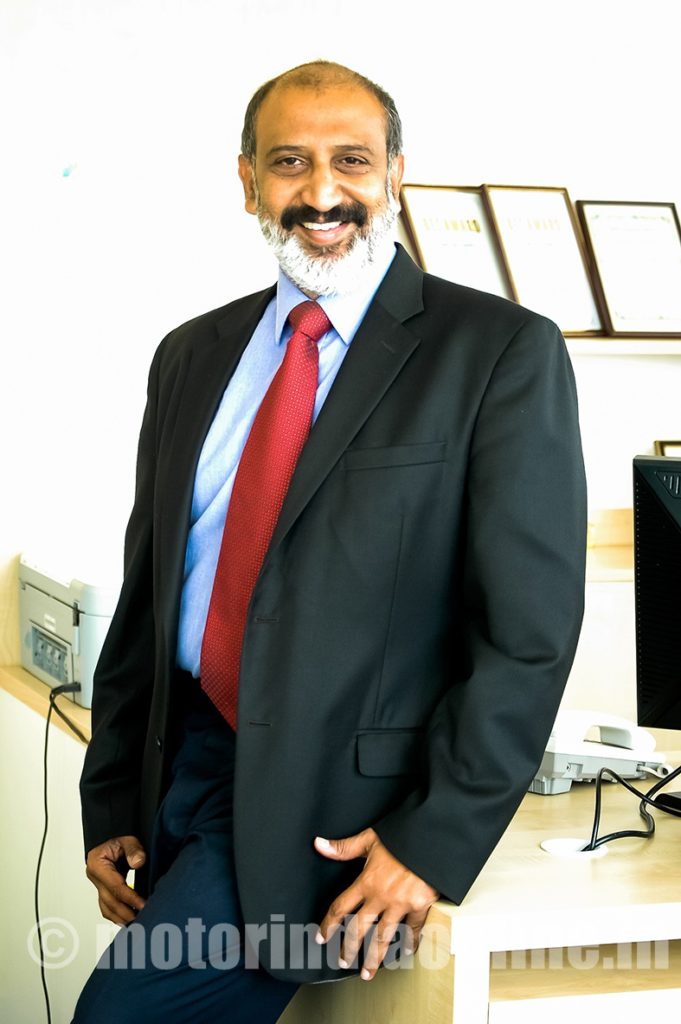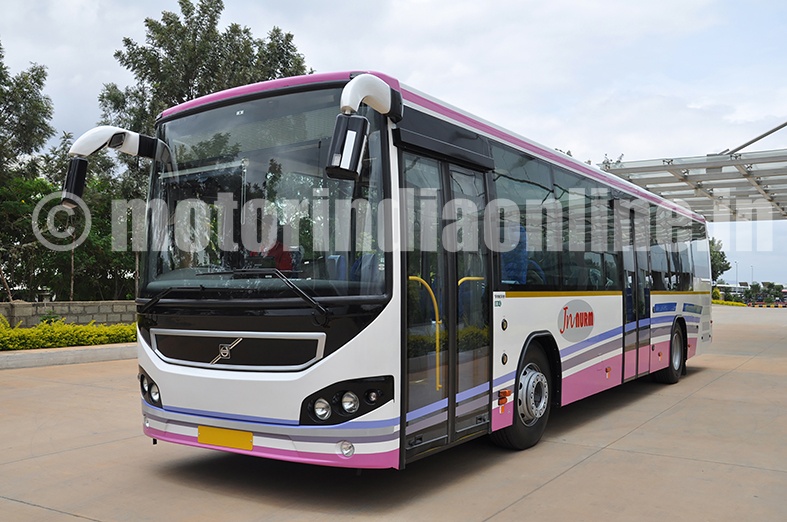The whole is greater than the sum of its parts. So said Aristotle, the Greek philosopher.
Volvo Buses, working on the same lines, is focused on the larger picture, helping India wean its population away from individual to mass transportation while working on various aspects at the ground level.
A stable foundation, consistent efforts, continuous research and experimentation, and intention to do larger good, perhaps, are crucial to create a successful system. This is what became evident from the personal remarks made by Mr. VRV Sriprasad, Business Head – India & South Asia, Volvo Buses, during a free-wheeling discussion with MOTORINDIA.

He said: “Our Vision for 2020 is all about what we see as a Vision for India’s transport sector by 2020. Making public transportation more acceptable must be consciously worked upon. We have invested long back in a programmed initiative called city mobility where we partner with the city authorities, perform studies and understand the challenges of the city and then work out solutions jointly with them to improve the quality of life through public transportation.”
Drawing upon its experiences in other parts of the world, Volvo Buses feels that it can help India evolve a robust and modern public transport system for the proposed smart cities. Hence the need for finding alternatives to fossil fuel.
He shared Volvo Buses’ experience, “Many years back, Europe faced a similar problem of how long the fossil fuel will last if it is really clean and how can we protect our environment and resources. So, Volvo experimented by creating eight identical trucks that would use eight different fuels like ethanol, CNG, biodiesel, diesel and electro mobility, among others. We tested them over a period of time, and then validated them to see which one proved to be the most efficient. Electricity proved to be the most efficient.”
Electro mobility can effectively be used for not only city buses but also for trucks that ply on city roads – be it garbage trucks, fire engines or water tankers.
Linear evolution
While electric mobility, perhaps, is the answer for a cleaner, greener and safer transportation, India lacks the “right ecosystem, currently, to leapfrog to it”.
Mr. Sriprasad observed: “Though the Central Government’s plan to create smart cities is welcomed by the industry, proper planning is needed for the project success. There are many elements that define a city as smart and each one must come upto a hygiene level to make it a smart city. Public transport must be made an equally important element just like environment, health facilities, and internet connectivity.”
It is evident that all the States are approaching the idea of making their cities smart in different ways. He said: “Not all the cities are giving public transportation the priority it deserves. But Bengaluru, Pune and Ahmedabad are already moving ahead in discussions and we have signed a couple of MoUs as well.”
According to him, a PPP model would be a key solution to achieve this, “We are working with agencies like ASRTU to get PPP model going for cities. As of today, we don’t have a PPP model for city transportation but only for inter-city transportation for coaches. So in this, one need not bother about resources and budgetary approvals. It merely requires inviting private partners who will run the buses for you and the city can benefit.”
But what needs to be kept in mind is that any process would yield results only if it is approached with a strategy. “Though the policy makers welcome the idea of electric vehicle, they believe that we can straightaway jump to electric buses and trucks. But it does not work like that. We would require quality and uninterrupted energy and the infrastructure to deliver that which is a tall order from the thrust perspective. So, it needs to be taken up in phases, like it has been done around the world,” he added.
Three-pronged strategy
Indigenization, greener and safer vehicles are the three areas that Volvo Buses has been striving for always. Come 2017, Volvo Buses is all set to make engines on the home soil instead of importing. Mr. Sriprasad stressed: “Our next big step is to look at localization. We have the technology as is required. Parts of the chassis would now be localized. And in the new year, we will have 12-meter city buses and coaches sporting engines made in Pithampur and not Europe.”
Volvo Buses sees itself involved closely with the Government functionary. He commented: “It is terrible that accidents keep happening but the real issue does not get addressed. But we are sharing with the policy makers such norms and parameters that should be made mandatory in vehicles so that it’s safer to travel. We are discussing where we could be more active like, say, identifying blind spots on the roads and such. For instance, Sweden has been following Vision Zero which means no death due to accident.
Stressing the need for closer co-operation among all stakeholders, Mr. Sriprasad said: “Interaction is needed between the Ministry and the manufacturers so that there is better alignment. The auto industry in India has the required technology. We are ready to bring in whatever modernization is needed. It will be a major effort for companies to be prepared with, say, Euro 6 engines, but what is needed is clarity in terms of the timeline and an assurance that the timeline will be met with by all the stakeholders. Imagine if we bring in Euro 6 by 2020 and the fuel is not available in half the country, then it does not make sense.”
In a nutshell, consistency and clarity in policy is what the industry expects today. Mr. Sriprasad affirmed: “Both the customers and the operators have been pushing for something like All India Permit rule but it’s yet be released. If it is, then uniform taxation will help the operators take their buses anywhere in the country. It will then help more people to get into this business. Today, nobody knows what will happen if they into this business because things are unclear. So business must be allowed to thrive and that’s why it cannot be merely ‘Make in India’ but also we have to use them in India. Otherwise we will only make here and export because we don’t have an enabling environment to use all that is made here.”
The industry as a whole has been making representations to the concerned Ministry for waiver duties and VAT on public transportation to make it more affordable.
New bus on the block
“Well, where there is a road, there will be a Volvo”, put Mr. Sriprasad jovially. Going ahead with its plan of running public transport with alternate fuel, Volvo Buses recently launched two hybrid buses serving the people in Navi Mumbai. “This is the first time when hybrids are being registered and launched in India and we are right there. These hybrids are completely homologated and built in our factory in India,” he added.
Driving India’s future transportation seems to be Volvo Buses’ most important deliverable.
